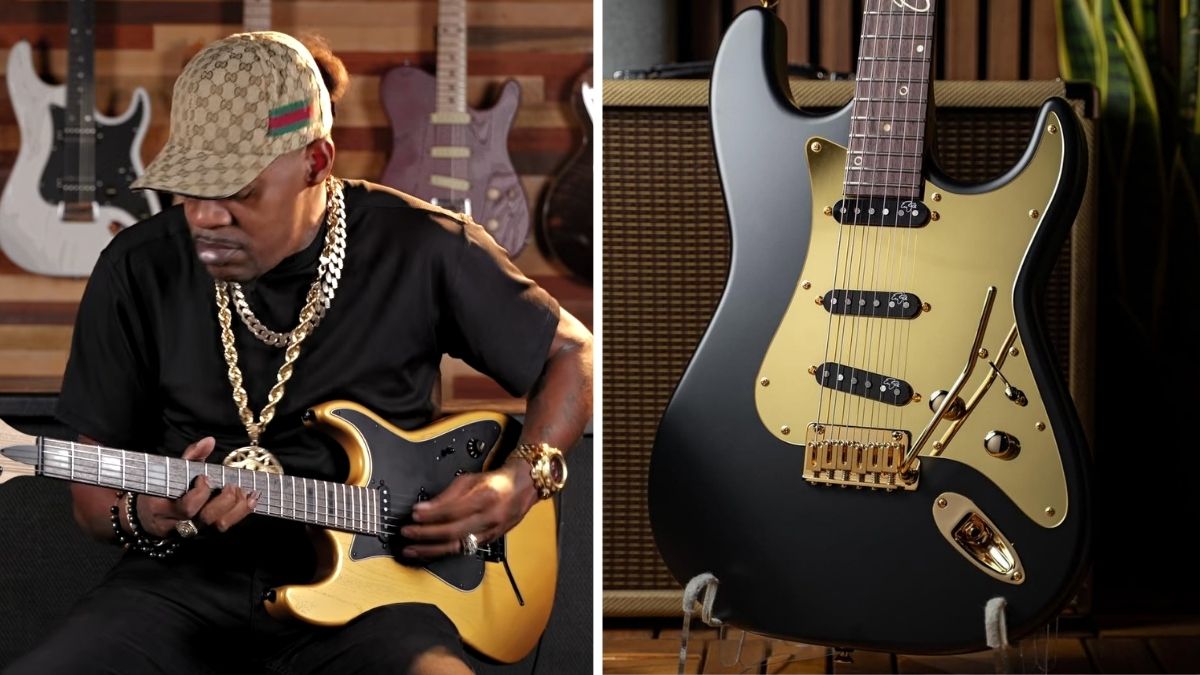Ben Howard: "I'm always trying to go down that delay rabbit hole – that's just what I like to do when I play guitars"
The British folk-turned-alt-rock songwriter on his evolving playing, battling his Echoplex, and assembling his breathtaking new album with Aaron Dessner

Ben Howard was crossing Portugal’s iconic Vascos De Gama bridge when he made the decision to put in a call The National’s guitarist/producer Aaron Dessner.
Already a fan of Dessner’s work, he denies it was a Damascene conversion. However, it was here, as mile after mile of the river Tagus rolled under him, that he found himself lost in the 17-minute noodles of Dessner’s 37d03d MixTape01 track Santa Agnes.
“There is just this rolling guitar part and these little layers pop in and out,” explains the British songwriter. “It’s a really beautiful little piece of music and I thought it'd be great to play something like that. So I just got in touch with him and he said, ‘Come on over.’”
It was a simple yet significant step for an artist who has always, until now, worked largely with his own hand-picked collective of hometown musicians. Recorded in trips to New York State at Dessner’s Longpond studio and homestead, Collections From The Whiteout pulls together the acoustic, electric and textural studies from Howard’s first three records into something quite independent.
We spoke to Howard about the challenges and lessons from the record, his ongoing trip down the delay rabbit hole and why being his label requires “a constant state of forgiveness”.
You’ve said you "needed the challenge", found here with a new collaborator, Aaron Dessner. What are the signs you've come to recognize in yourself or your music that you need a challenge?
“I’ve always had a kind of leering apathy that appears and subsides. I'm realizing that I sort of intentionally engage with it a lot: sometimes seeing it as a positive thing and sometimes seeing it as a very ugly trait. Sometimes that comes up and you realize there's a lot of things you could be doing. [At that time] I was living in Paris and not really working that much. I was sitting in a very privileged position and essentially being quite lazy.
All the latest guitar news, interviews, lessons, reviews, deals and more, direct to your inbox!
“It's like the plateaus you reach on guitars: you reach a comfort zone and if you don't try and push through, or work at it, you'll sit at that plateau. You won't get past it, and the instrument will get boring.
"I think I was sort of there with my songwriting as well. I had no immediate challenge. I think that's a lot of time when that happens [the apathy], you need someone else to spark something, and [help you] realize that all your minor ambitions aren't completely wrong, you can get the confidence back.”
You reach a comfort zone [on the guitar] and if you don't try and push through it, or work at it, you'll sit at that plateau. I was there with my songwriting. I had no immediate challenge
One result is that there's a greater array of technique on this record than any of your others. What do you attribute that to?
“I think [2018’s third record] Noonday Dream was a conscious effort to play something long-form and subtle. It seemed like everything was so noisy at the time. For me, it was a kind of rebellion against all the chaos of everything that was coming out – both musically and everywhere else.
"I just wanted to make something that forced you to sit down and listen and it was all settled textural things. It was almost mastered quietly, deliberately, to force you to actually listen and turn it up.
“Going in with Aaron, the way they approach records is a lot different. It was starting from the point of like stripping things back. Trying to find the strongest, most important sounds we could and put them together. Sometimes that came from from an acoustic, sometimes that came from sort of arpeggiated synths. And sometimes it came from like, weird, wonky guitar parts. It was just going with each of them realizing that they all had an importance.”
I liked Noonday, so this is not a criticism per se, but the songs are notably clearer and more defined on Collections From The Whiteout. Was that intentional?
“My thing is I'm always trying to go down that delay rabbit hole – that's just what I like to do when I play guitars. I like the clunky mistakes, the percussion, the rhythms that it brings out, which you don’t play but you hear in your head. So I guess the battle was really trying to make those parts cohesive. And it not being something that flooded a record and realizing that okay, 'Well, we can take the delays off and play a few little acoustic parts and that's all right as well.'
"Also, I think my Echoplex broke at one point! So that really threw the whole thing on its head because I didn't have much gear when I went to New York. I had my Echoplex, I had a pretty stripped-back pedalboard, and I had my electric. And then my fucking Echoplex went, so that forced me to take a few new avenues!”
If you stick any of that stuff through some analog gear, you can get some really interesting sounds. I've always been attracted to noise than actual guitar parts
So what were your main gear choices for the record?
“My go-to has always been my Big Muff through an Echoplex EP-1 – very much the John Martyn avenue – with acoustics through them. But then I play a Fender Jazz[master] most of time these days and that obviously does something different to those little boxes of magic.
"I generally run a soft chorus, I've got one from Fairfield Circuitry, which is a really beautiful, warm little chorus pedal. And then I have the Roland synth pedal, which is pretty tacky, but it is a fucking beast!
"I think that if you stick any of that stuff through some analog gear, you can get some really interesting sounds. I’ve always been more attracted to noise than actual guitar parts. Traveling around with an Echoplex is a pain in the arse, but it's worth it, as long as you're good with a screwdriver.”

The last time we spoke, back in 2014/15, you were playing Gibsons…
“Yeah, that would have been Forget Where We Were. I had a goldtop then and another Les Paul as well.”
What caused the shift to a Jazzmaster?
“I mean, I'm left-handed, so you get what you can get your hands on! I've never been searching for that fucking illustrious '59 Les Paul, or whatever – you get what you are given! This thing popped up, a '60s Jazz, and I just fell in love with it. The boys listen to a lot of Manchester guitar bands, a lot those cleaner, brighter, compressed guitar sounds.
"I think that rubbed off on me as well – you know, Vini Reilly [the delay impresario behind the Durutti Column] and stuff. Finding a person that was iconic in that guitar delay world and going, 'Fucking hell, someone's done this crazy-good!' It's been realizing that it's all right to be a weirdo with a delay pedal. Realizing that's what I enjoy.”
There’s a lot of variety on Collections… You've got something like the purely acoustic Rookery, which is quite trad compared with the last couple of albums and then Far Out, which has something that borders on an actual riff!
I've never been searching for that illustrious '59 Les Paul. This thing popped up, a '60s Jazz, and I just fell in love with it
“It is a riff, yeah! We had a good chuckle about that. I'm not a riffer and I just pulled one out of the bag there. Yeah, we did have a good laugh about that. I've even got a guitar solo on there..."
Yeah, on What A Day…
“Yeah, I let rip with a little solo there!”
What were you thinking, Ben!?
“I don't know! There's a lot of junk that got thrown away, but it just had a charm that little lick. There was an acceptance of putting a lot of tracks down and even clicking a couple of things [this time]. I felt I was pulling away from that for most of most of my career.
"I realized and that was alright, you know, in its own way. It frees you up to do interesting things, like when you've got a spare spare afternoon and you throw a solo at it. But there's plenty of stuff we recorded in Paris that was live. A live tape with a full band is still unmatchable, really.”
Reportedly, you cut it quite close in finishing the record amid the incoming US travel instructions, and had to make a run to the airport. Do you think that hard deadline helped?
“It's weird because it felt unfinished at that point. There was a lot we had gone back to New York to finish off and [the pandemic situation] just got O.T.T. very quickly. We wound up hightailing it to the airport with Gordon – the hero who always used to drive us over there.
There were unfinished bits. The mix process took a lot longer and mixing remotely is never fun for anyone
"Then, as we pulled into JFK, the car radiator exploded! It was just plumes of plumes of steam but we had to bolt out of the car [to make the plane] and go, ‘Sorry, Gordon… Hope you're all right!’ We just left him on the pavement with steam pissing out of the car…
“So yeah, there were unfinished bits. The mix process took a lot longer and mixing remotely is never is never fun for anyone. Eventually, it meant relinquishing that responsibility to the capable hands of [engineer] Jon Low and not being that voice in the background that’s like, ‘Err, do you want a bit more of the highs on that?’”

You've often eschewed chances to embrace or capitalize on your profile as a musician. For example, there were almost no social media posts for about eight months prior to the Collections announcements. It runs very much contrary to the common advice or expectation for many musicians. How do you get to that stage where you can run your life in that way?
“I don't know. I think it's just really realizing you have a choice with all these things, all the way through, even if people are telling you: 'You don't have a choice!' Yeah, there's sacrifices you make if you choose certain ways, but at the bottom of that, you've got to be happy with that choice.
“Certainly with social media, it's something I've never been very good at engaging with. I've always felt a lot of the platforms are a gloating space and they make other people feel shit.
With social media, it's something I've never been very good at engaging with. I've always felt a lot of the platforms are a gloating space and they make other people feel shit
“Obviously, I get a bit of flack for that, but it's making space for the things you feel are important. And it's hard, you know? There's tons of those little microscopic decisions that you make all the way along. There's so many of them that I guess it's just making time to do that. Otherwise, you can get flattened pretty quick by the steamrolling machine.”
It's easy to dilute yourself, isn't it? Without even realizing it…
“Yeah, diluting yourself is quite an interesting way to put it. Especially when you have a slice of success, there's a lot of angles coming in, [opinions] of how that should play out and it's really difficult to quiet it and remember what you wanted to do in the first place.”
So, for instance, with social media, did you have a conversation with your record label where you said, ‘Um, I'm just not going to do it…’
“No. It wasn't really a conversation, it was more of a state of constant forgiveness!”
Speaking of commerce in the music industry. There's never been Ben Howard fragrance or anything, but there is now a 1000-piece puzzle depicting nudist farmers on your merch site…
“Oh, is that out yet?”
It's on your store. Yeah.
“Bless them! Good crew, that lot!
So... why is there a nudist farmers jigsaw puzzle bundle?
“[Laughs] I don't know to be honest! We just thought it was a good idea. Everyone was up for the photoshoot, so we shot it! I got a 10,000-piece puzzle for lockdown. Not being a puzzle afficionado, I didn't really know how big these things were and, I slowly went mad trying to do a 10,000 piece puzzle. So I thought I would offload that madness onto other people. It's particularly hard as well because it's mostly green.”

I do love the idea that someone's going to lining up ass-cheeks at some point and be like, 'No... That's the other guy’s…’
“I know!”
When we last spoke around I Forget Where We Were, we had a good conversation, but it struck me that you weren’t particularly happy, day-to-day, at that point. You seem more grounded now.
“What, because I'm doing interviews?”
Yeah, maybe that’s not a fair metric…
“Maybe I’d quit smoking. Every time I quit smoking, everyone tells me to start again, because I'm unbearable.”
I imagine that was a difficult time to navigate, with the change from the first record to the second, in the face of expectations from all around you. It seems ultimately you've been vindicated in that because I Forget Where We Were is now viewed very positively. Are you happier now?
Happiness is not an on/off switch. It's more being able to experience the good moments and being able to look at them. That's probably the key, because they come and go
“I mean, happiness is not an on/off switch, is it? [I think it’s more] being able to experience the good moments and being able to look at them, as well. That's probably the key, because they come and go. But just being able to take two minutes and just go: 'That was pretty good.' But yeah, those little fleeting moments, they do come – they do come through.”
Finally, I wanted to ask you about an untitled song you played as part of a guitar lesson we did for Total Guitar back in London, in 2012. It’s got 315K+ views and all these comments saying, ‘I still have no idea how he plays like that. But that song is really good. Did he ever finish it?’ I’m going to have to play it back to you...
“Oh god. This is evil!”
Yeah, I'm sorry. I realize this will be excruciating. That’s why I've saved it until last, so you can walk out…
“[Listens] I remember that. That's one that ended up on the scrapheap with a load of others. It's not finished. I never committed it to tape. I still play guitar like that, though. It's not a bad guitar part, is it?”
It’s great. That’s why I felt compelled to ask. Some people have even learned to play it. I thought I should ask on their behalf…
“Yeah, sorry. I mean, I struggle to remember how to play songs on the last record, never mind that long ago!”
Collections From the Whiteout is available now via Republic Records.

Matt is Deputy Editor for GuitarWorld.com. Before that he spent 10 years as a freelance music journalist, interviewing artists for the likes of Total Guitar, Guitarist, Guitar World, MusicRadar, NME.com, DJ Mag and Electronic Sound. In 2020, he launched CreativeMoney.co.uk, which aims to share the ideas that make creative lifestyles more sustainable. He plays guitar, but should not be allowed near your delay pedals.
